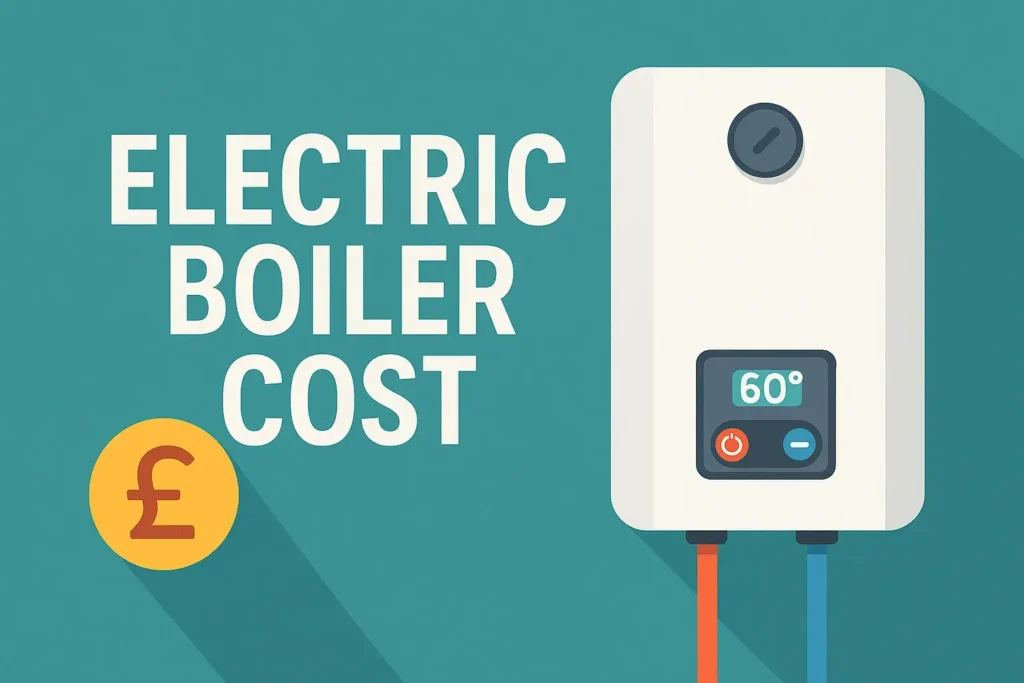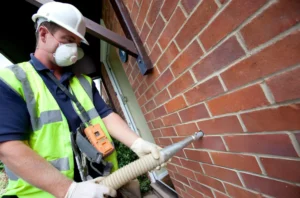In 2025, the cost of an electric boiler in the UK typically ranges from £1,500 to £4,500, including installation. The boiler unit alone can cost between £500 and £2,500, while installation fees usually add £500 to £1,500. Running costs are higher than gas, averaging £1,000 to £1,700 per year, depending on your electricity tariff and heating demand.
Table of Contents
ToggleElectric boilers are best suited for smaller homes, flats, and off-gas properties looking for a compact, low-maintenance heating solution. This guide covers everything you need to know about electric boiler prices, installation, running costs, pros and cons, and whether they’re right for your home in 2025.
What Is an Electric Boiler?
An electric boiler is a heating system that uses electricity to heat water for your central heating and domestic hot water supply. Unlike a gas or oil boiler, it does not burn fuel, making it cleaner, safer, and easier to maintain. Electric boilers are often compact, wall-mounted units, making them ideal for smaller homes, apartments, and off-gas properties.
How Do Electric Boilers Work?
Electric boilers function by passing water over electrically heated elements, similar to how a large electric kettle works. The heated water is then pumped through radiators or underfloor heating systems, or stored in a hot water cylinder for later use.
Types of Electric Boilers
- Electric Combi Boilers – Provide both heating and hot water on demand, ideal for small homes with limited space.
- System Electric Boilers – Require a separate hot water cylinder; suitable for homes with higher hot water demands.
- Storage Electric Boilers – Include an inbuilt water storage tank, allowing for off-peak electricity use.
When Are Electric Boilers a Good Option?
- Off-Gas Properties: Perfect for rural homes not connected to the gas grid.
- Flats or Small Homes: Their compact size and low installation requirements make them a strong choice.
- Environmentally Conscious Users: When powered by renewable energy tariffs, they can significantly cut carbon emissions.
Electric Boiler Costs in 2025 (FULL BREAKDOWN)
In 2025, the total cost of installing an electric boiler in the UK ranges from £1,500 to over £6,000, depending on the boiler model, installation complexity, electrical requirements, and your property size. While electric boilers can appear more affordable up front, many homeowners are surprised by hidden installation costs and the need for upgraded power supplies.
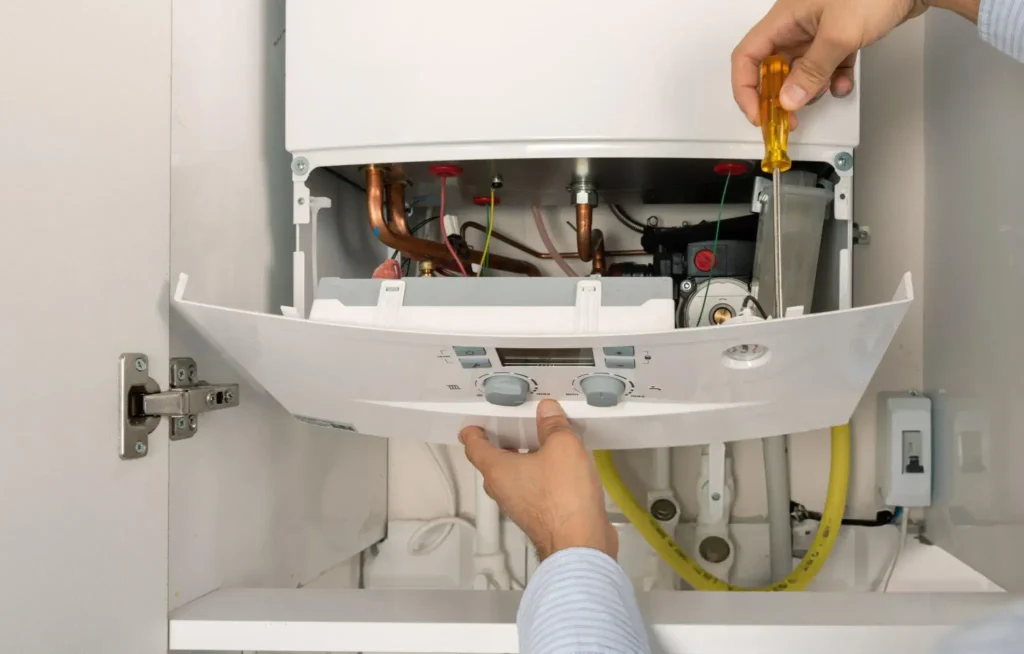
This section gives you a full breakdown of:
- The cost of different types of electric boilers
- Typical installation charges (including special cases)
- The total you should budget — with real-world examples from Reddit
A. Electric Boiler Unit Prices
The boiler unit itself typically costs between £800 and £2,500, depending on type, brand, size, and whether it includes a storage tank.
| Boiler Type | Typical Cost (incl. VAT) | Details |
|---|---|---|
| Electric Combi Boiler | £800 – £1,500 | Heats water on demand — compact and ideal for small homes and flats |
| Electric Combi with Storage | £1,500 – £2,500 | Includes internal storage tank for hot water — suitable for 2+ bedroom homes |
| Electric System Boiler | £1,200 – £2,000 | Requires separate hot water cylinder — ideal for homes with multiple bathrooms |
| High-Capacity Floor Units | £2,500 – £4,500+ | Suitable for large homes or light commercial use |
🛠️ Popular UK Brands (2025):
- Heatrae Sadia
- Elnur
- Electric Heating Company
- Fischer Future Heat
Reddit Insight:
“I paid around £1,400 for my Elnur boiler — not including install. It was the storage combi type.”
— r/UKPersonalFinance
B. Installation Costs
Installation fees can vary drastically based on:
- Whether you’re replacing a gas boiler or upgrading an older electric one
- The complexity of plumbing and electrical work
- Any rewiring or switch to three-phase electricity
| Installation Scenario | Estimated Cost (2025) | Notes |
|---|---|---|
| Basic swap (like-for-like replacement) | £500 – £1,000 | Simple job; electric combi in same location |
| Full installation (new pipework, wiring) | £1,000 – £2,000 | More labour-intensive; may include removing old boiler |
| New three-phase connection (if required) | £3,000 – £8,000 | Required for high kW boilers in large homes |
| New cylinder install (for system setup) | £500 – £1,000 | Cylinder and controls cost extra |
Reddit Insight:
“I didn’t realise I needed a new consumer unit and upgraded cabling — pushed the whole job over £3k.”
— r/DIYUK
C. Total Project Cost (Unit + Installation)
Here’s a more realistic look at what you should budget for a complete electric boiler setup in 2025:
| Home Size / Setup | Boiler | Installation | Total Cost (Estimated) |
|---|---|---|---|
| 1-bed flat (basic combi boiler) | £900 | £600 | ~£1,500 |
| 2-bed flat with stored water | £1,600 | £900 | ~£2,500 |
| 3-bed semi with cylinder (system boiler) | £1,900 | £1,200 | ~£3,100 |
| 4-bed detached (high power, 3-phase) | £3,500 | £2,500–£4,000 | ~£6,000–£7,500 |
🔍 Always request a full property assessment and power load test before installation.
More Real Customer Experiences from Reddit
“Our installer quoted £2,200 for the full setup with Elnur 9kW combi. It ended up closer to £2,700 with cabling and timer controls.”
— r/OctopusEnergy“We didn’t realise we needed a bigger fuse board. The boiler itself was cheap at £1,300, but the wiring cost almost £2,000.”
— r/UKPersonalFinance
Running Costs of Electric Boilers
How Much Does It Cost to Run an Electric Boiler in the UK?
Electric boilers operate at nearly 100% efficiency, converting almost all input electricity into usable heat. However, the running cost is high due to the price of electricity in the UK — typically 28p to 33p per kWh. For comparison, gas costs around 7p to 10p per kWh.
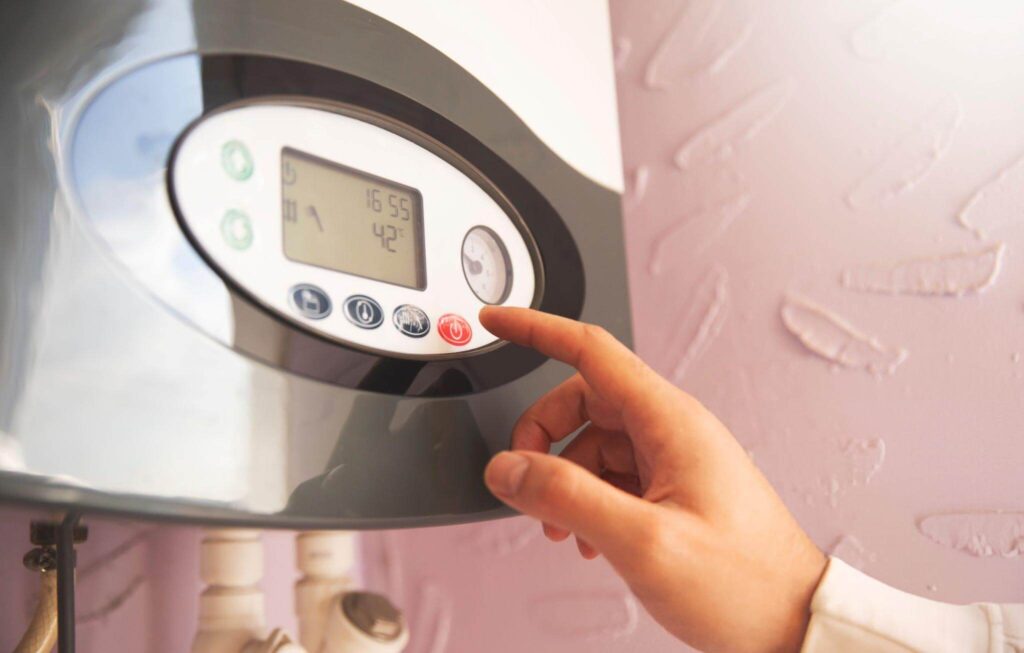
If you’re considering switching to an electric boiler, it’s essential to understand how much energy it uses, how long it runs each day, and how these factors influence your monthly energy bill.
Typical Monthly Running Costs
| Boiler Size | Avg Daily Use (3–4 hrs) | Daily Cost (@30p/kWh) | Monthly Cost (30 days) |
|---|---|---|---|
| 6 kW | 18 kWh | £5.40 | £162 |
| 9 kW | 27 kWh | £8.10 | £243 |
| 12 kW | 36 kWh | £10.80 | £324 |
These estimates are for heating only. If the boiler also provides hot water, the total may be even higher, especially in homes with multiple occupants.
What Affects the Running Cost?
1. Boiler Output (kW Rating)
The higher the output (e.g. 9kW vs 12kW), the more electricity it uses per hour. A typical small flat may use a 6–9kW model, while larger homes might need 12–15kW.
2. Electricity Tariff
Standard tariffs cost around 30p/kWh, but you could reduce this by switching to Economy 7 or Economy 10, which offer cheaper rates at night (as low as 10–15p/kWh).
3. Heating Demand & Usage
A well-insulated home with smart controls will require less runtime. Poor insulation and older buildings demand longer boiler use, raising monthly costs.
4. Hot Water Usage
Combi boilers heat water on demand, while system boilers maintain a cylinder at 60–70°C. Long showers, baths, and large households increase consumption.
5. Smart Controls & Timers
Smart thermostats and zone controls help reduce runtime by only heating areas when needed. Without these, boilers often run inefficiently and increase bills.
Real-World Experiences (Reddit-Backed)
Several UK homeowners have shared their experiences with electric boiler running costs:
- “It cost around £120–£140 a month to heat and provide hot water. That was in a small flat with minimal use.”
— r/UKPersonalFinance - “My 9kW boiler costs about £8 a day during winter, just for heating. I had to install a timer to bring it down.”
— r/OctopusEnergy - “With our storage system and three occupants, it was easily £200+ per month. We’re now moving to a heat pump.”
— r/DIYUK
These figures closely align with the estimates above and offer valuable insight into realistic monthly budgeting for electric-only homes.
Is It More Expensive Than Gas?
Yes — running an electric boiler is 2–4× more expensive than a modern gas boiler. A gas system heating the same home might cost £70–£120/month, compared to £150–£300/month for electric.
That said, electric boilers:
- Require less maintenance (no flue, no gas checks)
- Are 100% efficient at point of use
- Can be combined with solar PV or battery storage for greater savings
Tips to Reduce Running Costs
- Use Economy 7 or Time-of-Use tariffs to heat water or store heat off-peak
- Install smart controls to reduce runtime
- Keep hot water set to 60°C, not higher
- Use thermostatic radiator valves (TRVs) to reduce demand
- Improve insulation in walls, lofts, and floors to reduce heating hours
- Consider solar PV + immersion diverter (e.g. myenergi Eddi) to pre-heat water for free
Summary
In 2025, the average monthly running cost of an electric boiler in the UK is between £150 and £300, depending on boiler size, insulation, and usage. Households using 9kW to 12kW boilers for 3–4 hours daily report £8–£11/day in winter, especially if hot water is included. While electric boilers are 100% efficient, electricity’s high unit cost remains the key disadvantage. However, pairing electric systems with off-peak tariffs, smart controls, and solar PV can dramatically reduce long-term expenses.
Pros and Cons of Electric Boilers
Electric boilers are gaining attention as an alternative to gas boilers in UK homes — especially in off-gas areas and low-carbon retrofit projects. But while they offer several advantages, they also come with drawbacks that are important to weigh up before making a decision.
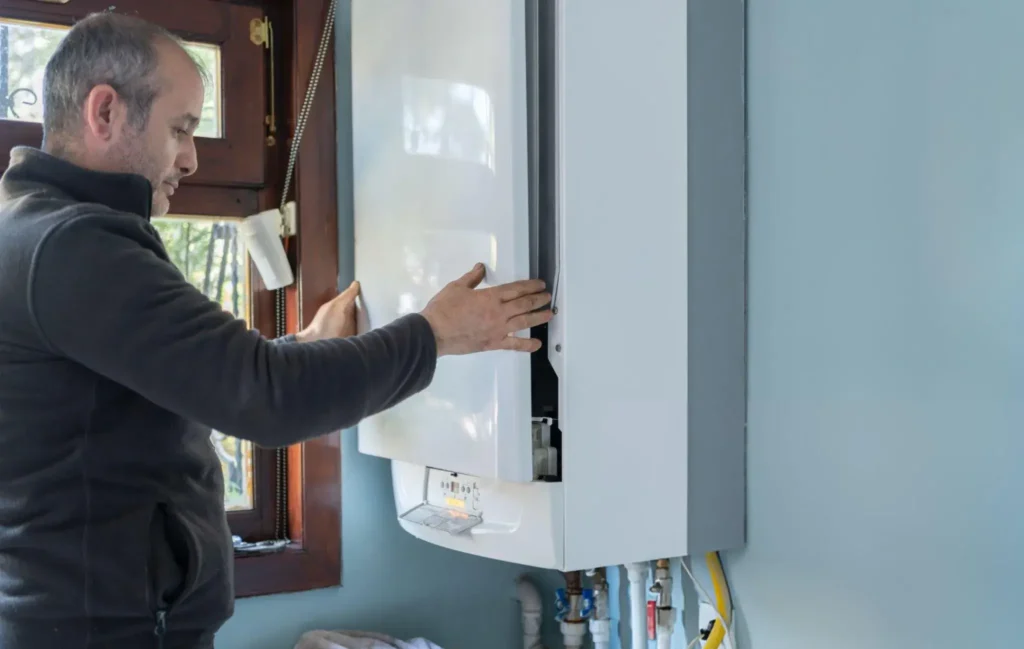
Advantages of Electric Boilers
1. 100% Efficiency at Point of Use
Electric boilers convert virtually all electricity into heat, meaning no energy is wasted through flue gases like with gas or oil systems.
An electric boiler has an energy conversion efficiency 100%
2. Zero On-Site Emissions
No combustion, no flue, and no carbon monoxide risk. This makes electric boilers a safer, cleaner choice — especially in well-sealed or urban homes.
An electric boiler emits zero on-site emissions.
3. Compact & Quiet Design
Most electric combi units are wall-mounted, slim, and near-silent during operation. Ideal for small homes, flats, or properties with limited space.
An electric boiler has a compact physical size.
4. Low Maintenance
No annual gas safety checks, no flue blockages, and fewer moving parts. That means fewer service visits and lower lifetime maintenance costs.
5. Ideal for Off-Gas Homes
For properties not connected to the gas grid, electric boilers provide a simple heating solution without needing oil tanks or LPG bottles.
- Ofgem reports ~4 million UK homes are off the gas grid, making electric systems more viable than ever.
6. Works with Solar PV or Battery Storage
You can use free solar electricity to power your heating or hot water — especially if you install an immersion diverter like myenergi Eddi.
Disadvantages of Electric Boilers
1. High Running Costs
Despite being efficient, electric boilers use expensive energy. With electricity averaging 28–33p/kWh, running costs can be 2–4× higher than gas.
- Electric boiler has typical running cost £120–£300/month
2. Not Suitable for Large Homes
Most electric boilers are limited to 12–15 kW output. Larger homes may struggle to maintain consistent warmth or fast hot water delivery — unless expensive upgrades (like 3-phase wiring) are installed.
3. Electrical Upgrades May Be Required
Older homes may need consumer unit upgrades or three-phase supply, adding £2,000–£8,000 to total costs.
Reddit: “The boiler itself was £1,500 but upgrading the electrics added another £2,500. Total job: over £4k.” — r/UKPersonalFinance.
4. Not Eligible for Most Government Grants
The UK ECO4 and Boiler Upgrade Scheme (BUS) currently focus on heat pumps and gas boiler replacements — not electric boilers. This means fewer financial incentives unless part of a wider retrofit.
5. Slower Heat-Up Time for Hot Water
Compared to gas combi boilers, electric units may take longer to deliver hot water — especially if heating a storage cylinder from cold.
Electric boilers can be a smart solution for small, well-insulated, off-gas homes, especially when paired with smart controls or solar panels. They’re clean, efficient, and easy to install — but high running costs, electrical limitations, and grant ineligibility are major drawbacks.
For homeowners planning a full electric heating upgrade, a better long-term option may be a heat pump, which offers similar benefits with lower running costs and greater grant availability.
Electric Boilers vs Gas Boilers
When choosing a new heating system, many UK homeowners compare electric boilers vs gas boilers — especially with rising gas prices, the push toward net-zero homes, and the phaseout of new gas boiler installations by 2035.
So, which is better for your home in 2025? Below is a complete comparison based on cost, efficiency, installation, and long-term performance.
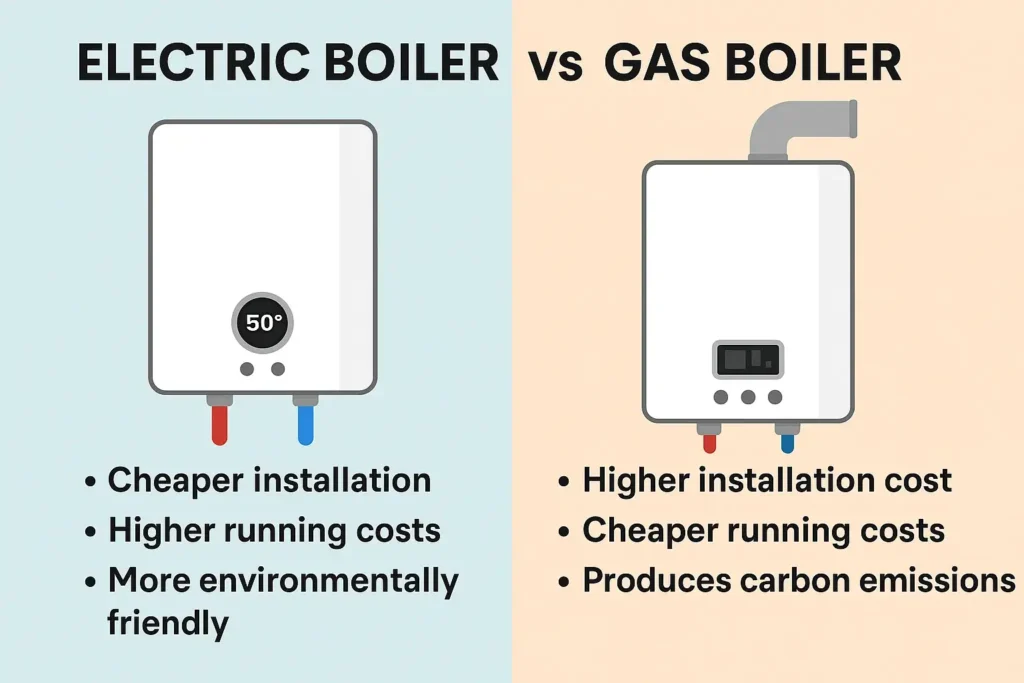
1. Purchase & Installation Costs
| Feature | Electric Boiler | Gas Boiler |
|---|---|---|
| Unit cost | £800 – £2,500 | £500 – £1,500 |
| Installation (basic) | £500 – £1,500 | £1,000 – £2,000 |
| Full install w/ upgrades | Up to £6,000+ (wiring) | Up to £3,000+ (pipework/flue) |
- Electric boilers are cheaper to buy, but may need electrical upgrades costing thousands.
- Gas boilers are more widely available and installers are easier to find.
Reddit insight:
“The boiler was £1,400 but the new cabling and breaker box added £2,500. With gas, we were quoted half.” — r/UKPersonalFinance
2. Running Costs
| Factor | Electric Boiler | Gas Boiler |
|---|---|---|
| Energy cost (per kWh) | 28–33p | 7–10p |
| Monthly heating bill | £150 – £300+ | £70 – £120 |
| Annual cost (typical) | £1,800 – £3,000 | £900 – £1,400 |
- Electric boilers are 100% efficient at converting energy to heat — but electricity costs 3–4× more per kWh than gas.
- Gas boilers are less efficient (~90–94%) but still much cheaper to run in most homes.
3. Environmental Impact
| Category | Electric Boiler | Gas Boiler |
|---|---|---|
| Emissions on-site | Zero (no combustion) | High (CO₂, NOx) |
| Grid impact | Depends on electricity mix (fossil or green) | High carbon footprint |
| Future readiness | Net-zero compliant | To be phased out from 2035 (new builds) |
Electric boilers produce no on-site emissions, making them ideal for low-carbon homes — particularly when paired with solar PV or green energy tariffs.
Gas boilers still dominate UK homes but are expected to be phased out in new properties from 2035, as part of the UK’s decarbonisation targets.
4. Maintenance & Lifespan
| Factor | Electric Boiler | Gas Boiler |
|---|---|---|
| Annual servicing | Not legally required | Required for safety & warranty |
| Maintenance needs | Low (fewer moving parts) | Medium (gas valves, flue, burner) |
| Typical lifespan | 10–15 years | 10–15 years |
Electric boilers have fewer components, reducing the chance of breakdowns and lowering maintenance costs.
5. Suitability by Property Type
| Property Type | Best Choice | Why |
|---|---|---|
| Small flat / 1-bed | Electric Boiler | Space-saving, no flue, quiet operation |
| Medium 2–3 bed | Gas Boiler | More cost-effective to run, better hot water recovery |
| Rural off-gas home | Electric Boiler or Heat Pump | Electric avoids LPG/oil systems |
| Large family home | Gas Boiler | Higher output with lower operational cost |
Is an Electric Boiler Right for You?
Whether or not an electric boiler is the best choice depends on several factors — including your property type, access to gas, insulation levels, and long-term energy plans. While electric boilers can work well in specific scenarios, they are often not the most cost-effective or grant-supported option in 2025.
If you live in a small, well-insulated flat or a one- or two-bedroom home, and you don’t have access to gas, an electric boiler might seem like a convenient solution. These systems are compact, easy to install, and require minimal maintenance since there’s no flue or combustion involved. In homes with low heating demand and solar panels, they can be paired with diverters (like Eddi) to heat water during off-peak times or when solar energy is available — lowering your electricity costs.
However, for most homes — especially larger ones — electric boilers come with significant drawbacks. High running costs, limited heating output, and the lack of government support make them less appealing compared to modern alternatives. If you’re planning a long-term energy upgrade or aiming to cut your monthly bills, it’s worth exploring better, grant-eligible technologies.
Want to Know What’s Right for Your Home?
At HNR Energy Solutions, we help homeowners across England and Scotland access fully funded heating and insulation upgrades — but eligibility depends on your personal circumstances and property type.
To qualify for Air Source Heat Pumps, solar panels, or High Heat Retention Storage Heaters (HHRSH) under the ECO4 scheme, you must be receiving qualifying benefits, such as Universal Credit, Pension Credit, or others outlined by the government.
If you are not receiving benefits, you may still qualify for insulation upgrades under the Great British Insulation Scheme (GBIS) — especially if your home is in Council Tax Band A–D and has a low EPC rating.
Systems We Install (Based on Eligibility)
| Your Status | What You May Qualify For |
|---|---|
| On qualifying benefits | Air Source Heat Pumps, Solar PV, High Heat Retention Storage Heaters, First Time Central Heating |
| Not on benefits, but low EPC + Council Tax Band A–D | Loft, cavity, and wall insulation under GBIS |
| Electric-only home (off-gas) | May qualify for electric heating upgrades under ECO4 or GBIS (if benefits apply) |
| Gas connection but no existing boiler | First Time Central Heating with grant (benefit eligibility required) |
Check Your Eligibility Below
Use the form below to find out if you qualify for:
Check If You Qualify For ECO4 Grants
No pressure. No sales. Just clear answers based on your address and benefit status.
👉 It takes just 60 seconds to check.
We’ll email or call you with the results — and if you’re eligible, we’ll arrange a free survey.
Electric Boiler Cost – FAQs
How much does it cost to run an electric boiler per month in the UK?
Running an electric boiler typically costs between £120 and £300 per month depending on the boiler size, heating hours, insulation quality, and electricity tariff. A 9kW boiler running 3–4 hours per day can use 27–36 kWh/day, costing £8–£11 daily at standard rates of 30p/kWh.
Are electric boilers cheaper to install than gas boilers?
Yes, electric boilers are usually cheaper to install than gas boilers. Most units cost £800–£2,500, and installation can be as low as £500–£1,000 if no rewiring is needed. However, if your home requires electrical upgrades or a three-phase supply, total installation cost may rise to £4,000–£6,000.
Can I replace my gas boiler with an electric boiler?
Yes, you can replace a gas boiler with an electric boiler — especially in small homes or off-gas flats. However, electric boilers are not always suitable for large properties, and switching from gas may increase your monthly heating bills due to higher electricity costs.
Do electric boilers qualify for the ECO4 grant?
No, electric boilers are not currently eligible under ECO4 or the Boiler Upgrade Scheme (BUS). These grants support air source heat pumps, high heat retention storage heaters, and first time central heating — but only for homeowners receiving qualifying benefits.
If you are on a low income or receive benefits like Universal Credit or Pension Credit, you may be eligible for a fully funded heat pump or electric storage heating system, along with free solar panels or insulation.
Conclusion: Should You Choose an Electric Boiler in 2025?
Electric boilers can be a convenient and clean heating option for small, off-gas homes, especially where space is limited and maintenance needs are minimal. They’re compact, silent, and efficient at the point of use — making them ideal for certain properties.
However, in 2025, electric boilers come with important trade-offs. High running costs, limited power output, and lack of government grant eligibility make them less attractive than alternatives like air source heat pumps, electric storage heaters, or first time central heating systems — especially if you qualify under the ECO4 or Boiler Upgrade Scheme (BUS).
At HNR Energy Solutions, we offer a tailored, whole-home approach. Whether your property is gas-connected or fully electric, we’ll help you find the most energy-efficient, grant-supported, and cost-effective heating solution — backed by a TrustMark-registered installation team.

